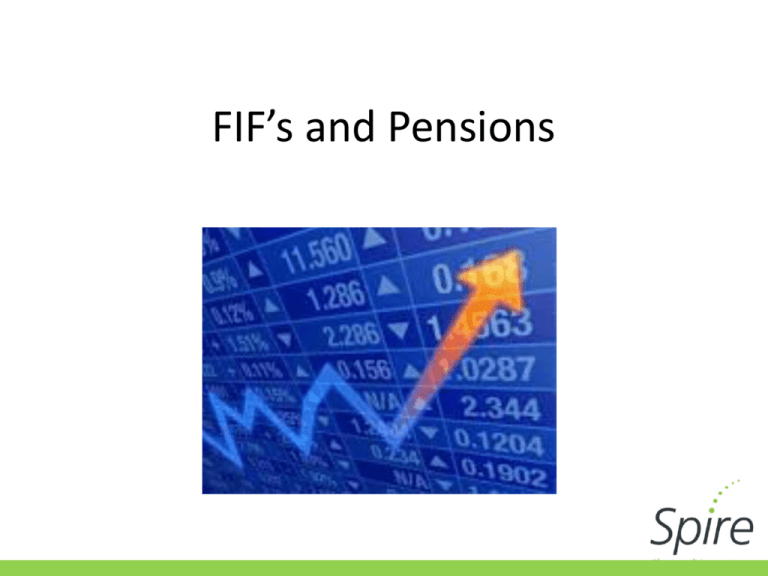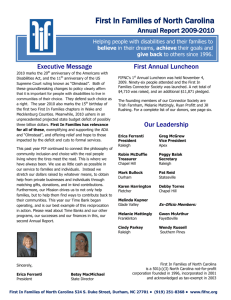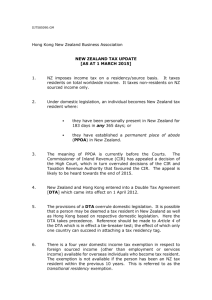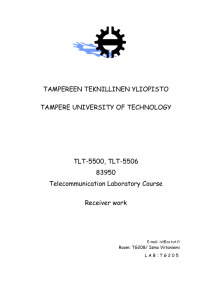TAX POOLING
advertisement

FIF’s and Pensions Investing Offshore • Involves a range of complex commercial and taxation issues. • Added to usual issues with investment is the need to deal with either or all of: 1. Foreign Investment Fund (FIF) Regime 2. Controlled Foreign Company (CFC)Regime 3. Financial Arrangements Regime Foreign Companies? • Where a taxpayer holds shares in a company, it is important to determine if it is a foreign company or not. • A foreign company is defined as either a company that is either - not resident in New Zealand; or - is resident in NZ, but treated as nonresident under a DTA. NZ Resident Company For a Company to be resident in NZ it must be one of the following: • Incorporated in NZ; • Have its centre of management in NZ; • Have it’s Head Office in NZ; and • Have directors, in their capacity as directors, exercising control of the Company in NZ. What is a foreign investment fund? An offshore investment held by a New Zealandresident taxpayer who holds: • less than 10% of the shares in a foreign company • less than 10% of the units in a foreign unit trust • between 10% and 40% of the shares in a foreign company which is not a CFC Cont... An offshore investment held by a New Zealandresident taxpayer who holds: • an interest in a life insurance policy where a FIF is the insurer and the policy is not offered or entered into in New Zealand. • an interest in a foreign superannuation scheme. It does not include interest earned from term deposits, bonds, debentures or money lent. FIF Attributing Interest • To be subject to the FIF regime a person must have a direct income interest in a foreign company that the ACT does not exempt from the FIF regime. “Attributing Interest in a FIF” This can include a direct income interest in a foreign company or rights to benefit from a foreign super scheme or life insurance policy. An ‘option to acquire’ is not a FIF. Exemptions from the FIF Regime • ASX Listed Australian Companies (s EX31) – IRD lists, changes yearly. • Controlled Foreign Companies (s Ex 34) • Australian FIF (over 10%) (S EX 35) – during the time owned. • Australian Unit Trust (s Ex 32) – maybe tax free in Oz but not necessarily here. • Non Resident of Transitional Resident (s EX 41) • Foreign Super Scheme (other than FIF Superannuation Interest) – a persons right to benefit from a foreign super scheme as a beneficiary or a member is not an attributing interest in the foreign scheme if the right is not a FIF for the person. • Non-Resident Pension or Annuity (s Ex 43) – doesn’t fall within the FIF rules, taxed at 100% Exemption status applies at the time applied for, starts from acquisition. De Minimis • Cost of attributing interests is less than or equal to $50k. • Includes all: – – – – Foreign company shares FIF Superannuation interests; and Foreign life insurance policies Dividends reinvested or purchases Only applies to natural persons and estates (not Trusts), ability to elect in. FIF Calculation Methods • Fair Dividend Rate (FDR) – annual, most common • Cost • Comparative Value (CV) • Deemed Rate of Return (DRR) • Attributable FIF Income (AFI) Individuals can select between the Fair Dividend Rate and the Comparative Value. If more than one portfolio must use consistent method. FDR Method - - - normally ignores actual return and taxes income of 5% on foreign share investments. Opening value will be the closing value from previous year. Portfolio basis (0.05 x opening value) + quick sale adjustment CV Method • Takes into account capital gains and dividends from an investment. • The total return is calculated using the comparative value formula in section EX 44 of the Income Tax Act 2004: (closing market value of shares held + total sales proceeds + dividends received) – (opening market value of shares held + total value of purchases) CV Method Cont.. • Only natural persons and ‘family trusts’ can use this method for foreign shares • No losses when you elect to use method • Special circumstance if guaranteed profits are returned - can offset losses up to zero value. If managed portfolios, ie Craigs Investment Partners options for both of these methods will be shown, you will need to decide which one is best for the client. Foreign Superannuation • New rules (s CF 3) apply from 1 April 2014. • There was the ability to apply to transfer prior to 1/4/14 with a 15% concession – could either be returned in 2014 or 2015 years. • 4 Year Exemption • If non-resident under DTA may not get exemption. Reasoning for new rules • Many taxpayers have historically not returned FIF income in respect to their pensions/super schemes when they ought to have. • Changes aim to simplify the taxation by making all funds taxable when they are transferred to NZ, either in part or fully. • The new rules do not apply if the pension has been returned under the FIF rules prior to 20 May 2013 and have continued to be returned up to date of transfer. What are rules? • Existing Rules allow where a taxpayer has a FIF superannuation interest, previously returned the interest under the FIF regime rules and continues to do so, any withdrawl /transfer will not be taxed. • If not previously returned as part of the FIF regime, income will be taxable at time of transfer. • Transfers or withdrawls from 1/1/2000 – 31/03/14 were able to be taxed under existing rules or use the Concessional rules. Allow for income to be taxed at 15% of the amount of the transfer. Option to return in 2014 or 2015. Transfers or Withdrawls after 31 March 2014 • If FIF income has been returned on foreign super funds prior to 20 May 2013, tax payer can continue to return income under FIF regime rules • If they do not return under FIF rules for any year after 20 May 2013 this will be treated as election not to return under the FIF rules going forward. • If not FIF regime, the lump sum will be taxable at the time of the transfer or withdrawl using either Schedule or Formula method. Exclusions within New Rules • Only transfers from offshore to NZ or Australia are taxable. • Overseas withdrawls still taxable. • Withdrawls or transfers from Australia are not taxable (DTA). • Transfer upon death is not taxed – the subsequent withdrawls or transfer will be taxed based on NZ residence of both the recipient and deceased. • General four year grace-period for non transitional residents. • May be allowed to withdraw from Kiwisaver toet tax meet tax obligation. Recommendation • Do not give financial advice! • If you have a client that has FIF’s or Foreign Superannuation Funds you have two options……





